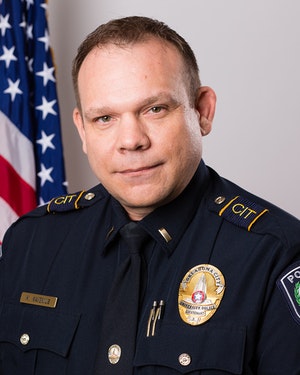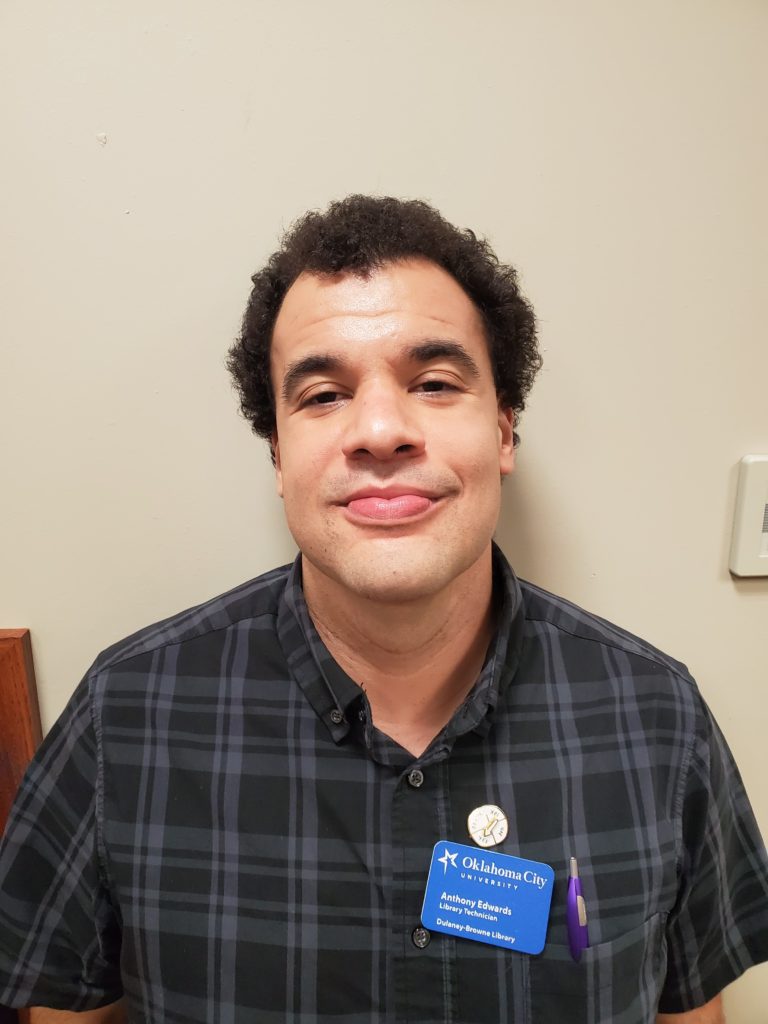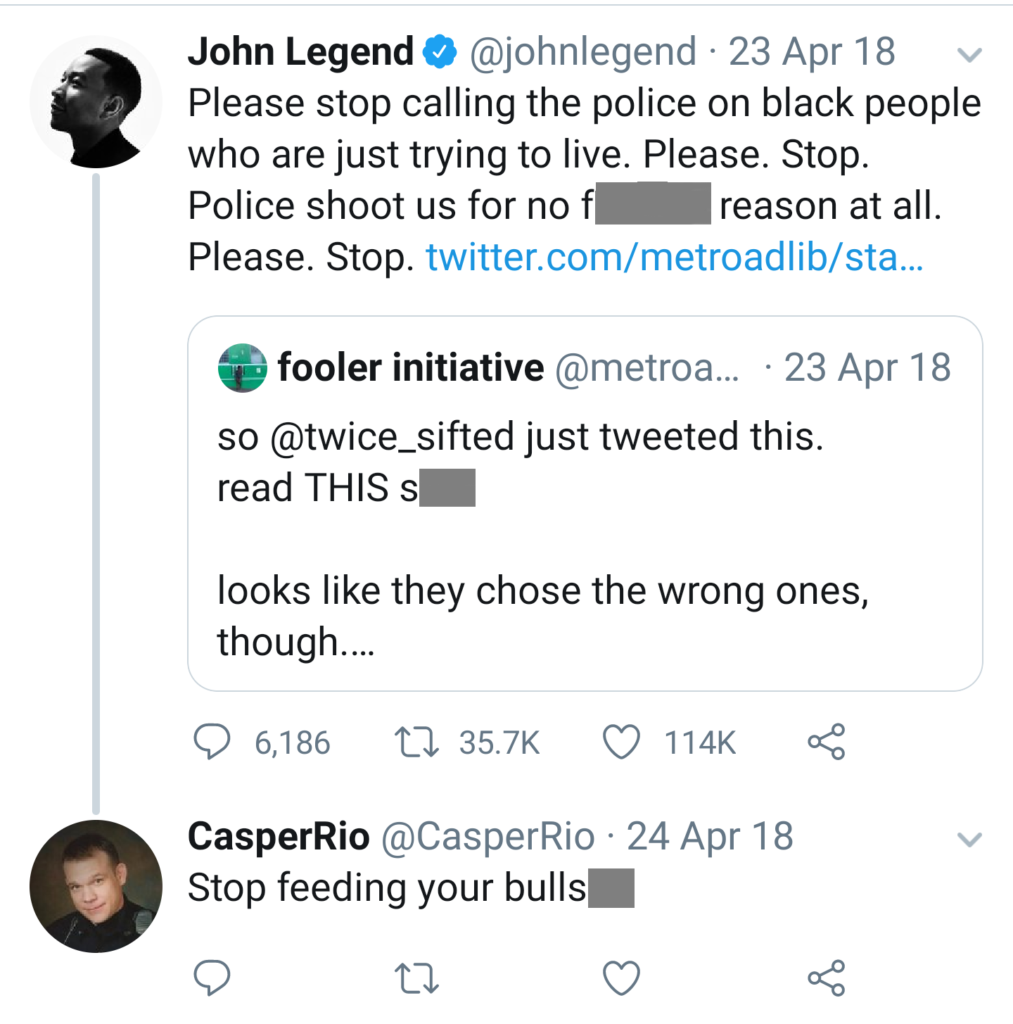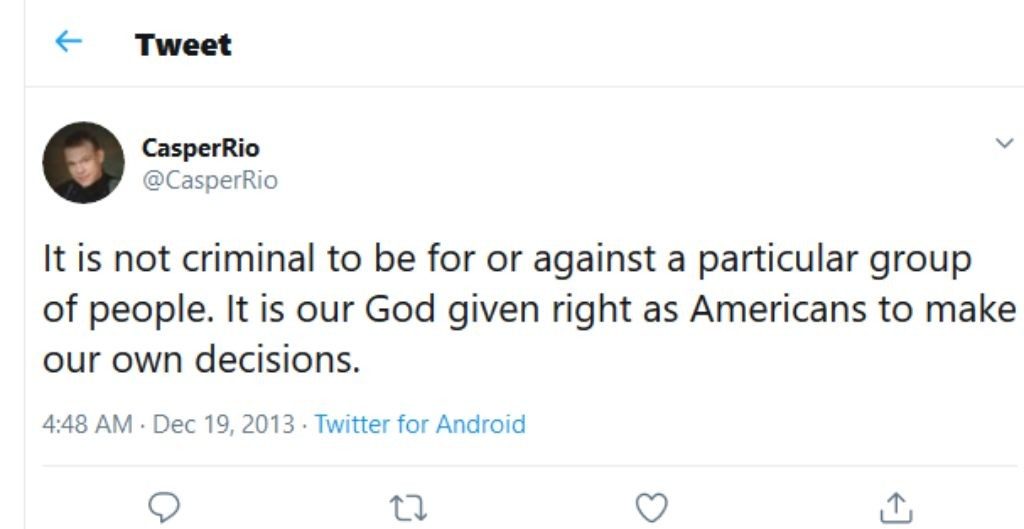A staff member has submitted a grievance of racial profiling and harassment against an OCU police officer.

Michael Kavenius, OCUPD lieutenant

Anthony Edwards, Dulaney-Browne Library circulation technician
Anthony Edwards, Dulaney-Browne Library circulation technician, has worked at OCU since 2014. On July 10, 2019, Edwards said he had just arrived to work at the library around 1 p.m. when he was approached by Michael Kavenius, campus police lieutenant, who asked to speak with him privately. Kavenius then accused Edwards of spreading false information about him, Edwards said.
Kavenius’s accusation related to a post that had been circulating in the OCU Facebook group in June. Students began sharing a 2010 article in the group about Kavenius, detailing his firing by the Glenrock, Wyoming Town Council after he tasered a 76-year-old man who was driving a tractor during a parade and disobeyed a traffic command.
Students expressed outrage that an officer who committed this act against an elderly man is now a lieutenant for campus police. The posts were taken down by administrators.
Kavenius did not respond to multiple requests for comment.
Edwards said when Kavenius approached him, he asked to speak privately with him.
Kavenius began working at OCU in 2011 and left when Former Police Chief Jennifer Rodgers joined campus police in 2018. After Rodgers was terminated in 2019, Kavenius returned to campus police.
“He said, ‘someone’s been spreading rumors about me and I heard it was you,’” Edwards said.
Edwards said he told Kavenius he had heard of the posts circulating but he didn’t know where it had started.
“Then he makes this implied threat, saying, ‘well, you’ll be hearing from Shauntae’ or Joey in HR,’” Edwards said.
After leaving the library, Kavenius returned with Police Chief Rusty Pyle and began talking to Edwards and another library employee, Edwards said. He said both men continued discussing who was involved in spreading rumors about Kavenius.
“Kavenius looks me right in the face and says, ‘I think it might be someone with Black Lives Matter or an alumni might have,’” Edwards said.
Edwards said he identifies as Black and Native American.
“That comment was aimed directly at me,” Edwards said.
After the encounter, Edwards said he coauthored an email explaining the situation to Joey Croslin, vice president for human resources, and Shauntae’ Moham, employee relations manager, with another library employee who witnessed the situation and wished to remain anonymous for fear of retaliation.
Moham responded to the email and said she would communicate the information to Croslin, but several days later, Croslin still had not responded to them.
The library employee who wished to remain anonymous said they were frustrated by the lack of communication with HR, considering the seriousness of the issue.
“I was threatened and harassed by a police officer at my work,” they said. “If that’s not a serious issue, I don’t know what is.”
Edwards said they filed a grievance against Kavenius on July 19. They also filed a complaint with the Equal Employment Opportunity Commission, a federal agency that administers and enforces civil rights laws against workplace discrimination.
The allegations in the grievance included the following: Kavenius abusing his power as a police officer by initiating an investigation without the knowledge of human resources, Kavenius engaging in harassing behavior toward library employees, Kavenius racially profiling Edwards because of the Black Lives Matter comment, and Kavenius exhibiting racist viewpoints on social media.
After doing research on Kavenius, Edwards said he found things Kavenius had tweeted or liked that implied racism and victim-blaming in cases of sexual assault. Edwards took screenshots of the tweets he found most concerning.

In 2018, John Legend tweeted, “Please stop calling the police on black people who are just trying to live. Please. Stop. Police shoot us for no f—ing reason at all.”
Kavenius, whose twitter handle was @CasperRio, replied to the tweet saying, “Stop feeding your bulls—.”
In 2013, Kavenius tweeted, “It is not criminal to be for or against a particular group of people. It is our God given right as Americans to make our own decisions.”

In Oct. 2018 during the Brett Kavanaugh trials, Kavenius liked several tweets that accused Dr. Christine Blasey Ford, a woman who claimed she was a victim of sexual assault by Kavanaugh, of speaking out as part of a smear campaign.
“This concerns me, because number one, what is he going to do if, god forbid, there’s a sexual assault on campus, if he doesn’t agree with their viewpoint?” Edwards said. “Is he going to deny that there was an assault?”
Kavenius has since deleted his Twitter account.
“He’s allowed to have his own opinions, but you don’t bring them into the workplace, especially when you’re a cop,” Edwards said.
Edwards said after not hearing anything about the grievance for a month, he contacted Casey Ross, university general counsel. He met Ross and President Martha Burger on Aug. 29 to discuss the grievance.
“Casey said her investigation said there’s no policy or law violation that she sees, but there are very serious HR issues that are going to have to be looked into by President Burger,” he said.
Edwards said he did not think the investigation was conducted fairly.
“It took so long for the investigation to begin,” he said. “We were 12 days out from the incident from the time the investigation began.”
Officials are trying to sweep the grievance under the rug, he said.
“No, this isn’t over, and it’s going to grow until you do something about it,” he said.
The EEOC will investigate, regardless of whether the university acts, Edwards said.
“If the EEOC does find that there was discrimination or a likelihood, the university is going to get sued,” he said. “They’re going to get sued either way. It’s just going to be a matter of time.”
After the meeting, Edwards said he is losing faith in university officials’ ability to protect their students, faculty and staff.
“It is very clear to me that either President Burger’s and Casey’s moral compasses are defective, or they’re completely broken,” he said.
Destini Carrington, psychology senior and president of the Black Student Association, said she hasn’t personally had any issues with campus police, but the students of BSA have to be conscious of tensions with campus police after a 2017 incident in which Broderick McQuarters, a student involved in BSA accused campus police of racial profiling.
“How can we trust someone who in a tweet says, ‘we can choose to hate who we want to,’” Carrington said. “If we have an issue on campus, who can we call? At this point, it’s someone who is supposed to be the leader for their team not upholding an unbiased position.”
Officials have a responsibility to protect minority students, Carrington said.
“That’s something that members of our campus get paid to do,” she said. “It’s their responsibility to have a safe space for us on campus.
Carrington said she is frustrated by officials removing posts from the OCU Facebook group.
“Blinding us from the issues is not a form of protection,” she said.
Edwards said he will continue to speak out about the issues on campus.
“I know they want me to shut up and not say anything, but I’m well within my rights,” Edwards said. “They were trying to intimidate people into not using their First Amendment rights.”
Edwards said he contacted the National Association for the Advancement of Colored People for help.
Garland Pruitt, president of the NAACP Oklahoma City branch, said he has opened an investigation into the situation.
A few months is too long to not address the issue, Pruitt said.
“Look at what the complaints are and let the police department know that this cannot be tolerated,” he said. “This is overdue.”
If university officials don’t bring disciplinary action against Kavenius, NAACP officials will take action, he said.
“They have fallen short, and we are going to confront them. he said. “We will have to take it to the media, and the state and then to the national office.”
NAACP officials will be working with impacted minority communities on campus to help situations like Edwards’s be brought to light, said Sara Bana, Oklahoma civil rights advocate who has worked with the NAACP on several investigations.
“If Title IX and HR are incapable of dealing with survivors in an ethical way, we need to set up a way through another avenue for those complaints that have more of a foundation of trust,” she said.
Bana said students can contact her at sara@sarabana.com if they need to file a complaint about any issue.
“We need to demand for accountability, equity and equality.”
Leslie Berger, senior director of university communications, released a statement to Student Publications which stated the following:
“Matters involving individual employees are personnel issues, which cannot be discussed. Oklahoma City University has high professional standards for all employees, including our police officers, and prohibits discrimination of any kind. Our police department is focused on giving OCU students and employees a safe place to live, work, and learn. The university has a continual police training program in place. Every officer completes more than 25 hours of training through the Council on Law Enforcement Education and Training (CLEET) each year. The OCU Police Department is committed to providing the highest level of service to the OCU community.”
Levi Harrel, dean of students, has planned a mandatory diversity workshop for all Greek Life students before Fall Break. The workshop will be open to the campus community.
Harrel said the workshop is not a direct result of any allegations of discrimination, but part of furthering diversity and inclusion at OCU.
“We are not dismissive of situations that perhaps were discriminatory to anyone, but this is part of the continued education of the campus community,” he said.
Croslin and Moham were unavailable for comment.


Best you can see in the morning !